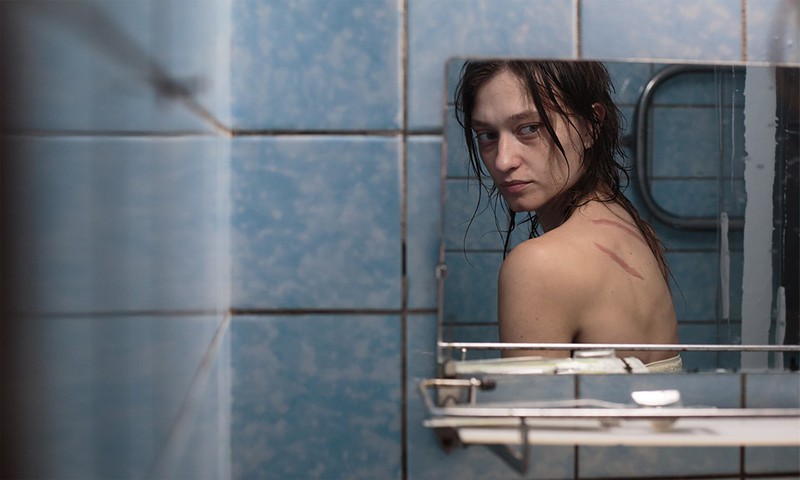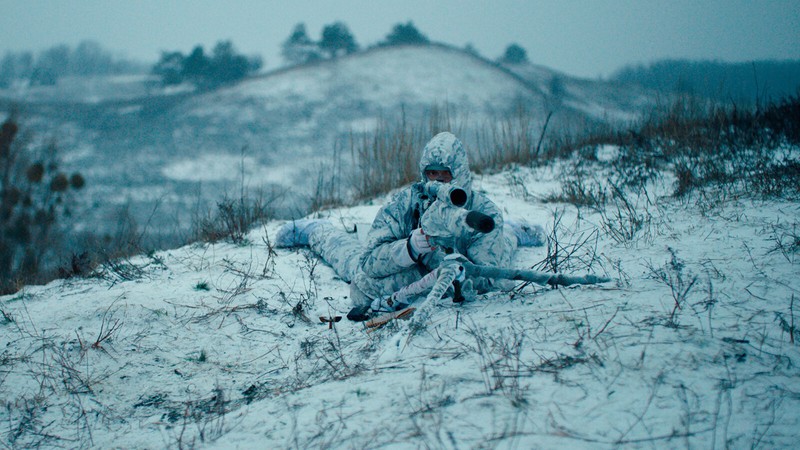18. Oktober 2022
The Ukrainian Cinema is Not Only About War Notes from Molodist Film Festival at Filmfest Hamburg 2022
This year, the Ukrainian film festival Molodist became a guest of the film festival in Hamburg. It took place from September 29 to October 8 in the German city, where a national program of feature and short films was shown. Ukrainian film critic Nataliia Serebriakova talks about the brightest films of the Molodist Competition.

BUTTERFLY VISION
© Filmfest Hamburg
BETWEEN US (Solomiia Tomashchuk)
The full-length debut of the founder of one of the Lviv theaters, Solomiia Tomashcuk, tells the story of a strange and tragic friendship between two women – twenty-year-old party girl Sasha (Anastasia Pustovit) and fifty-year-old gynecologist Anya (Irma Vitovskaya). Sasha is married to reliable and decent Zahar, a war veteran of Donbass, but she loves going to clubs, sniffing cocaine and leads a promiscuous sex life. At night, she hides in a closet during a panic attack – she had a difficult childhood with an abusive mother. It is the lack of female intimacy that pushes her to impose herself as a friend to the gynecologist Anya, an older and more experienced woman. (Before that, Sasha has to have an abortion, since she does not know who the father of the child is.) Anya herself has personal problems. Husband Pasha, who works right there in the clinic, is cheating on her, and her son Igor seems to be fascinated by the right-wing radical movement. However, a tragic incident occurs, after which the friendship between Anya and Sasha is tested for strength.
Tomashcuk says she was inspired while filming by contemporary thrillers like David Fincher's Gone Girl. However, it seems that her film is made according to the patterns of television series. Two favorites of the Ukrainian public, Pustovit and Vitovskaya, play brilliantly, but this is not enough for the film to keep its structure and not fall apart before our eyes. Even the ragged, dynamic editing, which adds pace to the film, does not save. So when the story ends abruptly, literally dousing the viewer with cold water, you are already almost grateful that the film is over. In general, this is a rather glossy spectacle with a touch of melodrama, a story about typical women's problems of the upper stratum of society in the capital’s pre-war crowd.
BUTTERFLY VISION (Maksym Nakonechnyi)
The military aerial reconnaissance officer Lilya (Rita Burkovska) was raped in captivity by the Russian military. When Lilya returns home, her husband Tokha and her mother are waiting for her. The news that his wife is expecting a child strikes Tokha, he joins the right-wing radical movement and participates in the destruction of a Roma settlement. But the court releases him from custody due to his wife's pregnancy. A pro-Russian blogger calculates Lily's pregnancy and posts a video on YouTube, where he says that «punishment was taken over by Russian soldiers.» Tokha cannot withstand such pressure ...
The personal is intertwined with the social, the private with the political, war invades space and breaks lives. Lilya’s dreams fall apart into pixels, a shaggy giant butterfly appears in those visions, it soars, flapping its wings. Flashbacks return the heroine to captivity, but the faces of the criminals remain invisible. Director Maksim Nakonechniy, who previously shot a series of short films about LGBT soldiers in Ukraine, thoroughly prepared for filming, having studied the stories of former and current military men and women. He wrote the script together with the famous Ukrainian director Iryna Tsilyk, who brought her female vision to the story. This is the first film that speaks openly about rape and the traumata of women soldiers in modern Ukrainian cinema. The movie is the winner of the Palic Film Festival, as well as the owner of a number of other prestigious awards that are absolutely deserved.
PAMFIR (Dmytro Sukholytkyy-Sobchuk)
Leonid, nicknamed «Pamfir» (Oleksandr Yatsentyuk), returns to his village on the border with Romania after spending a lengthy period abroad to earn money. He is met by his teenage son Nazar and his wife Olena, with whom he immediately has passionate sex. He also sees his mother. At home, the usual routine awaits him: Nazar does not want to go to church, but at Olena’s request, he participates in the rehearsal for the church choir. One evening, as he is helping the pastor, an incident occurs – a dramatic fire breaks out in the church. Pamfir surmises that it was his son who was to blame for what happened. Important family documents are burned along with the church, and Pamfir is now forced to resort to smuggling again in order to earn money. These events unfold on the eve of the traditional Malanka carnival.
Dmytro Sukholytkyy-Sobchuk presented his film for the first time at Cannes this year. The fact is that Pamfir grew up in the Cannes laboratory, where Sukholytkyy-Sobchuk repeatedly rewrote the script. The approach to rehearsals is also interesting, when the director did not let the actors read the entire script, but only their roles - it is known that Christopher Nolan or Ken Loach do the same. The debut movie turned out to be daring, dynamic, atmospheric, as if Sergei Parajanov met Guy Ritchie. In many ways, this was facilitated by the Bukovinian dialect, which the characters speak, which, unfortunately, the Western audience will not be able to distinguish by ear. However, even a blind person can feel the Transcarpathian flavor of the film.
POKUT (Andrii Kokura)
Sixteen-year-old Asya’s (Kateryna Hretskykh) mother died in a car accident. Now Asya is sitting in the kitchen with her father and his new girlfriend Vika and trying to have dinner. However, she is insolent to her father and especially to Vika, and the family dinner ends in a scandal. Later, Asya meets a stranger in the Kyiv metro who becomes her secret friend and goes on a hitchhiking trip, disappearing from home for a week. Alone with herself, she recalls her mother, conversations and walks with her.
This film has a special destiny. Firstly, director Andrii Kokura is currently only 19 years old, and he is a professional figure skater. Secondly, Kokura filmed it absolutely without money and producers, completely on his own – with the help of his father. And, finally, during the filming of the film, a tragic event happened – Andrii's father Valerii Kokura died. Therefore, the viewer should get a special impression from this meditative, but a little naive film. Kokura says she is fond of films by Andrei Tarkovsky and Wong Kar-wai. Perhaps this mix characterizes the direction in which this work was done.
SNIPER: THE WHITE RAVEN (Marian Bushan)
Ukraine at the end of 2013. Together with his pregnant wife Nastya, Mykola (Pavlo Aldoshin) lives in a self-dug hole on recently purchased land near Horlivka in Donetsk region. The couple lives in seclusion and does not touch anyone. Until Russia annexed Crimea and parts of Donetsk and Luhansk regions. Russian soldiers raped and killed Mykola’s pregnant wife and burned down his house. So he decided to take revenge. The main character joins the ranks of the Armed Forces of Ukraine and becomes a sniper. The plot of the film is based on a real story.
Sniper: The White Raven by Marian Bushan is a dynamic dramatic work: rhythmic, but at the same time sensual. Unfortunately, it does not work like the audience hit Cyborgs, but it decently occupies the niche of audience cinema on a military theme. This is Ukrainian history, which is not from textbooks, but from the present of real people. The military part in the film is really well constructed: the shooting is real. No matter how funny it sounds, a big plus is at least the fact that the actors hold their weapons correctly and aim not a millimeter from the eye, which would be impossible in reality.
STOP-ZEMLIA (Kateryna Gornostai)
High school student Masha (Maria Fedorchenko) is a melancholy girl who is in love with her classmate Sasha. Meanwhile, she has true friends - Yana and Senya. All of them go to school, to discos, spend the night in each others apartment. One day, Masha posts a beautiful photo of a frozen autumn leaf on glass on Instagram, an anonymous person answers her, and a correspondence begins. Masha wants to think that Sasha is hiding behind an unknown nickname, but is this true?
Katerina Gornostai’s film seems to be about nothing, but it is a very talented work. First presented at the Berlinale in 2021, the film has already collected a lot of awards in Ukraine, becoming the winner of the Odesa Film Festival, as well as receiving the national Kino-Kolo award. And this time the movie quite deservedly became the winner of the national competition of Molodist in Hamburg. The film is full of accurate observations and unbanal metaphors. For example, it has a recurring badminton scene. A strong wind causes the shuttlecock to return to one of the players without hitting the second. It turns out that the player plays himself serves and beats himself. This is a metaphor for the one-sided feelings that the heroine experiences. Fine directing.

SNIPER: THE WHITE RAVEN
© Filmfest Hamburg